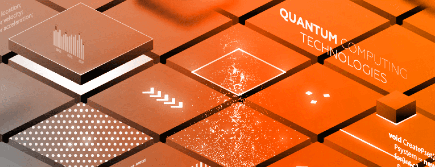간단히 말해, 양자 컴퓨팅은 양자 역학(양자 물리학이라고도 함), 또는 원자 및 아원자 수준의 사물에 대한 설명을 사용해 컴퓨터 처리 능력과 속도를 획기적으로 향상시키는 것입니다.
왜 양자 컴퓨팅이 중요할까요?
일반 컴퓨터로 그야말로 수백만 년 걸리는 작업을 양자 컴퓨터는 단 몇 초 만에 완료할 수 있습니다. 따라서 양자 컴퓨팅의 핵심 혜택은 컴퓨팅 프로세스의 가속화에 있습니다. 즉, 일반 컴퓨팅을 훨씬 더 강력하게 만듭니다. 더 빠른 컴퓨팅을 적용할 수 있는 분야는 매우 광범위하며, 훨씬 개선된 사이버 보안부터 크게 향상된 고객 경험, 특정 결과나 답을 빠르게 도출하기 위해 많은 컴퓨팅 성능이 필요한 모든 것에 이르기까지 다양합니다.
양자 컴퓨팅은 머신러닝(ML)과 인공지능(AI)의 잠재력을 실현하는데도 매우 중요한 역할을 합니다. 양자 컴퓨터는 무한한 시나리오를 놀라울 정도로 빠른 속도로 실행할 수 있기 때문에, 자신에게 주어진 핵심 임무나 작업에 대해 가능한 최고의 방법으로 학습할 수 있는 잠재력을 가지고 있습니다.
양자 컴퓨터는 어떻게 작동할까요?
기존 컴퓨터가 1 또는 0인 트랜지스터를 사용해 정보를 처리하는 반면, 양자 컴퓨터는 1 또는 0이 동시에 될 수 있는 큐비트를 사용합니다. 더 많은 트랜지스터를 연결하면 전력은 선형적으로 증가하지만 큐비트를 연결하면 양자 컴퓨팅 성능이 기하급수적으로 증가합니다. 이것이 바로 양자 정보의 기본 단위이자 양자 컴퓨터의 작동 방식에 중요한 큐비트의 힘입니다.
즉, 양자 컴퓨팅의 가치와 작동 원리를 쉽게 설명하는 가장 좋은 방법은 동전을 떠올리는 것입니다. 모든 동전에는 앞면과 뒷면이라는 양면, 즉 값을 지닙니다. 그러나 동전을 던지면 동전은 두 값(앞면과 뒷면) 사이에서 공중에 떠 일정 시간 동안 회전합니다. 일반 컴퓨터는 앞면이나 뒷면만 읽을 수 있으므로 동전이 공중에서 회전할 때 동전이 제공하는 정보로는 아무것도 할 수 없습니다. 하지만 양자 컴퓨터는 실제로 이 회전 상태를 동전의 앞면과 뒷면이 동시에 있는 그 자체의 값으로 읽을 수 있습니다.
이것은 강력한 함의를 가지고 있습니다. 예를 들어 1과 0만 사용하는 4자리 PIN을 떠올려 보세요. 일반 컴퓨터는 1과 0만 읽을 수 있기 때문에 이 PIN을 결정하기 위해 4개의 숫자 슬롯(예: 1 또는 0)의 모든 가능성을 검토하여 가능성을 제거한 후 최종적으로 올바른 번호에 도달해야 합니다. 하지만 양자 컴퓨터는 같은 공간에서 1과 0을 겹칠 수 있기 때문에 실제로 모든 가능성을 한 번에 처리할 수 있습니다.
양자 컴퓨팅의 한계와 도전 과제
물리학자 리처드 파인만이 양자 컴퓨팅에 대한 아이디어를 처음 제안한 이후 약 40년 동안, 컴퓨터 과학자들은 양자 컴퓨팅이 어떤 문제를 해결하는데 유용한지 밝혀왔습니다. 그러나 양자 컴퓨팅이 위에서 언급한 사이버 보안과 ML의 활용 사례에 실제 적용될 만큼 이해되고 개발되기까지는 아직 갈 길이 멉니다.
또한 체스 게임, 항공 스케줄링, 정리 증명과 같은 간단한 작업에서도 양자 컴퓨터는 적어도 현재 상태에서는 기존 컴퓨터와 동일한 알고리즘 제한을 많이 겪을 것입니다.
이러한 한계는 디코히어런스(양자 컴퓨터과 환경 간의 원치 않는 상호 작용으로 인해 오류가 발생하는 현상)와 같이 실제 양자 컴퓨터를 구축할 때 발생하는 현실적인 어려움에 더해집니다.
하지만 양자 컴퓨팅은 의심할 여지 없이 컴퓨터 과학의 미래 분야이며, 세계 최고의 컴퓨터 과학자들이 컴퓨터 처리 능력의 비약적인 발전을 위해 부지런히 개발하고 있는 분야입니다. 더 이상 "왜" 또는 "무엇을"이 아니라, "언제"가 문제입니다.



